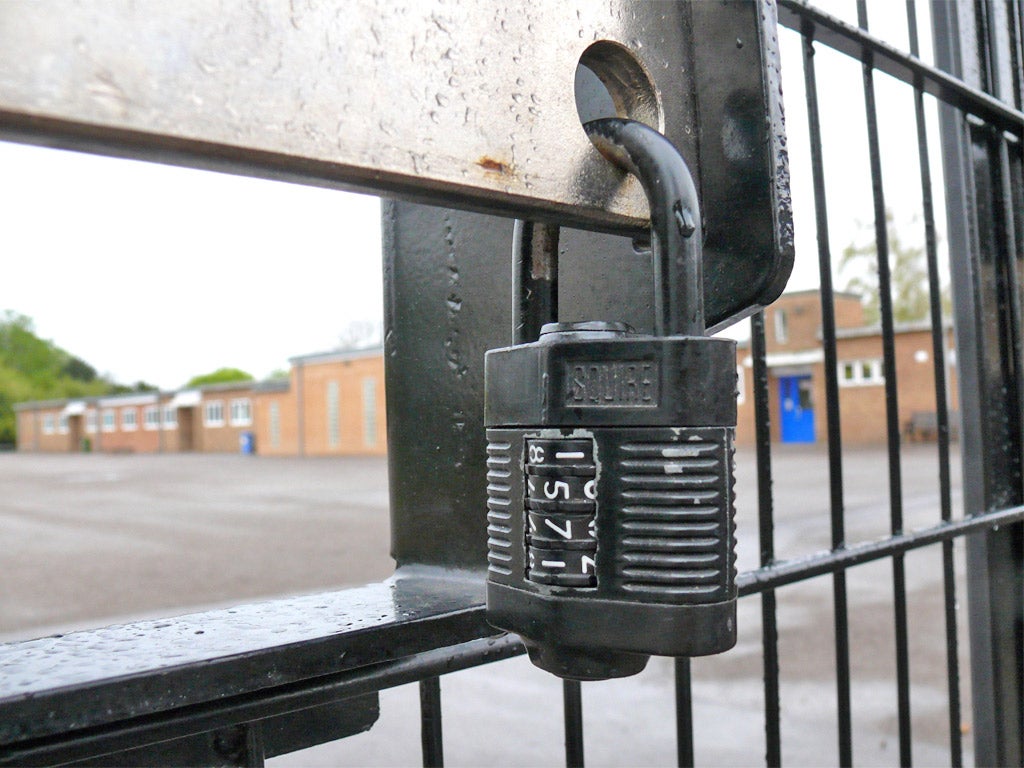Schools to be shut by head teachers' strike
Most primaries and many secondaries face closure on 30 November day of action

Your support helps us to tell the story
From reproductive rights to climate change to Big Tech, The Independent is on the ground when the story is developing. Whether it's investigating the financials of Elon Musk's pro-Trump PAC or producing our latest documentary, 'The A Word', which shines a light on the American women fighting for reproductive rights, we know how important it is to parse out the facts from the messaging.
At such a critical moment in US history, we need reporters on the ground. Your donation allows us to keep sending journalists to speak to both sides of the story.
The Independent is trusted by Americans across the entire political spectrum. And unlike many other quality news outlets, we choose not to lock Americans out of our reporting and analysis with paywalls. We believe quality journalism should be available to everyone, paid for by those who can afford it.
Your support makes all the difference.Head teachers are to go on their first-ever national strike, closing almost all of the country's primary schools and hundreds of secondary schools, their leader predicted last night.
Schools throughout England, Wales and Northern Ireland face the threat of closure on 30 November – the day of a scheduled strike by public-sector staff and civil servants against plans to cut their pensions, Russell Hobby, the general secretary of the National Association of Head Teachers (NAHT), said in an interview with The Independent.
Members of the union are incensed about the proposals, which would mean increased contributions and a cut in pensions for most heads, as well as the long-term prospect of a higher retirement age. The result of the ballot will be revealed this afternoon, with a Yes vote marking the first national strike in the union's 114-year history.
The action will be a blow to the Government, which had hoped the revised offer it made just over a week ago would take some of the heat out of the demands for industrial action.
Mr Hobby said last night: "If I had to predict it, it would obviously be a Yes vote. No union has so far voted No and the majority of votes were cast before the Government's revised offer.
"We're stronger in the primary sector and most primary schools would shut" in the event of a strike.
He indicated his members were still unhappy with the revised offer because only those due for retirement within the next 10 years would keep their pension entitlement. "Tactically, that move was very clever in terms of them regaining some of the moral high ground, but it only protects 50 per cent of our membership who will retire in the next 10 years. We're faced with deciding: do we care more about our older members? Anyway, some of our older members have said they still would say Yes because they want to protect the entitlement for the education service."
Mr Hobby said he would give the Government up to a week after the declaration of the vote to see if it was prepared to enter into more meaningful negotiations over its proposals before confirming the strike would take place. But some hardliners within the Conservative Party have suggested that ministers had already gone too far in their offer to the unions.
Head teachers and their deputies are the only employees who can legally take responsibility for the safety of children, so if they strike the schools must shut. The NAHT said last night it represented 85 per cent of primary schools and 40 per cent of secondary schools in England, Wales and Northern Ireland, but Mr Hobby argued the union had "strength beyond our numbers" in terms of the impact the strike would have.
Subscribe to Independent Premium to bookmark this article
Want to bookmark your favourite articles and stories to read or reference later? Start your Independent Premium subscription today.
Join our commenting forum
Join thought-provoking conversations, follow other Independent readers and see their replies
Comments